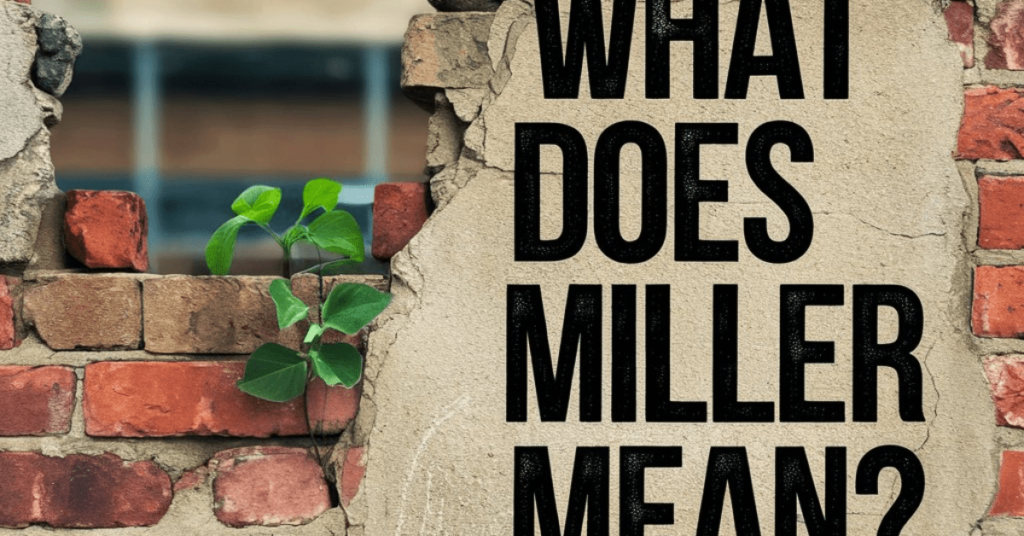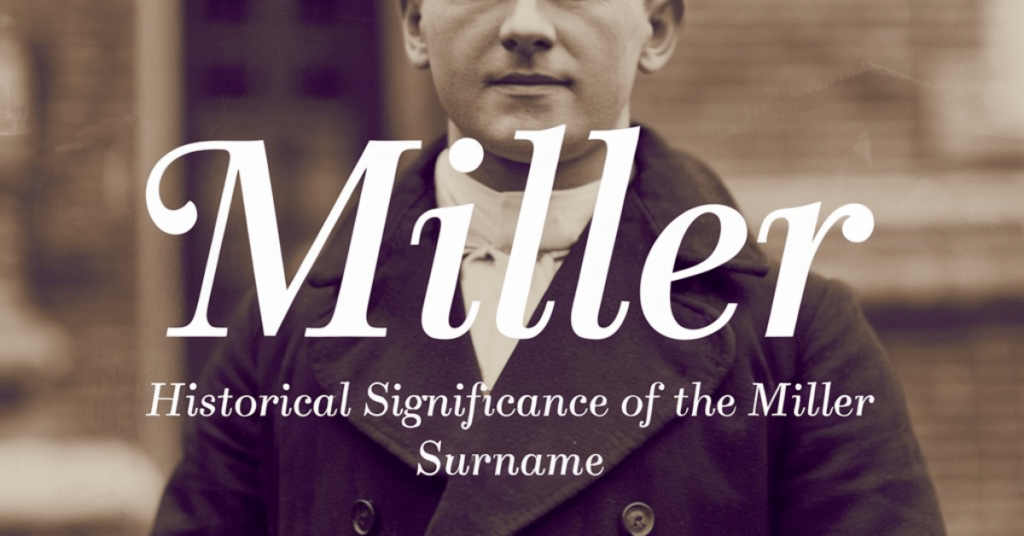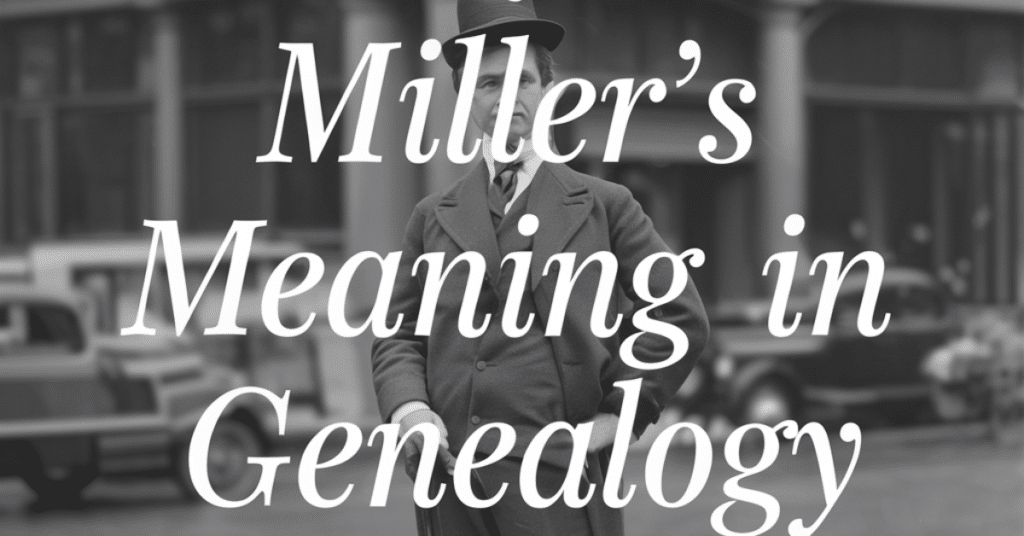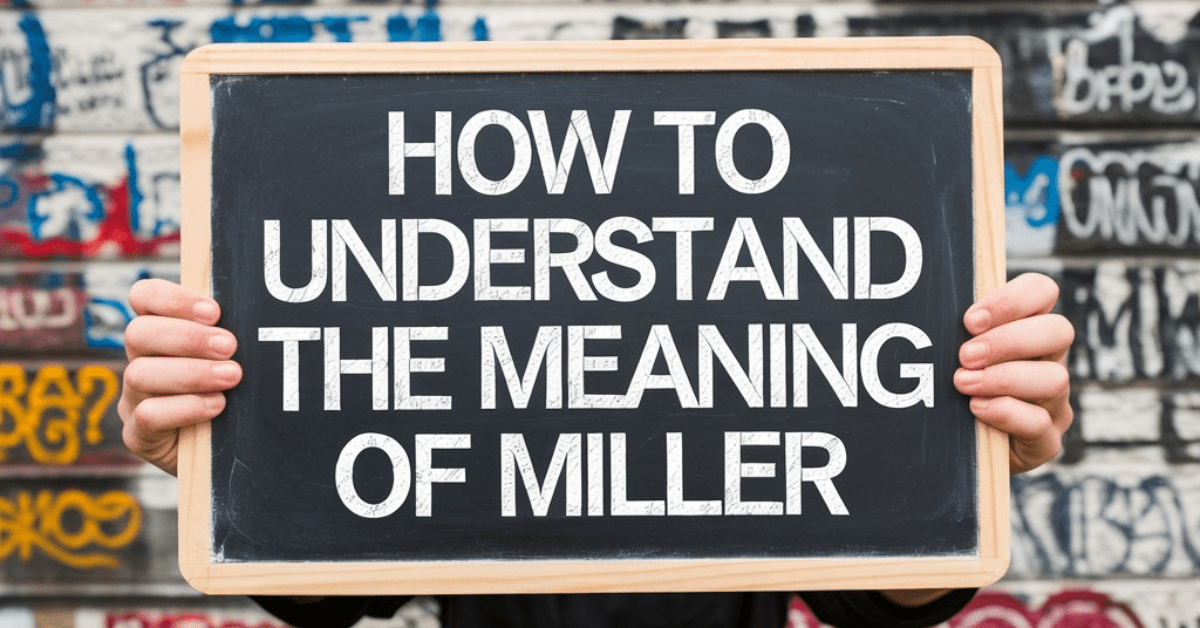The surname “Miller” is one of the most common and well-known surnames throughout the English-speaking world. But what does this name mean? And how has it evolved? Whether you’re searching for your lineage or just wondering about the origins of a name. Understanding Miller’s meaning can provide interesting insights into its history, importance, and relevance today. In this comprehensive guide, We will explore the etymology of Miller. Cultural meaning and its widespread use shows

What does Miller mean?
The surname miller is an occupational name derived from the Middle English word “mill”, referring to a mill that ground grain into flour and worked in a mill. This profession was important in the Middle Ages. This is because mills play an important role in community life. Providing essential food to the population…We are The surname Miller is therefore associated with people who ran factories or were closely associated with milling as a business.
Development of a professional surname
Miller was one of many surnames that came from this occupation, along with others such as Smith, Carpenter, and Baker, at a time when people were more commonly identified by occupation. These names became a way to distinguish individuals and families based on their work. The Miller surname spread widely due to the importance of milling in agricultural society.
Miller’s linguistic foundations
The origin of the name “miller” can be found in the Old English word “myln” or “mylen,” which comes from the Latin “molina,” which means mill. In addition to its origins in English, The name Miller also has variations in other languages. Just like the name “Müller” means the same thing in German. In some regions of France, the surname “Meunier” also refers to Millers.
Historical Significance of the Miller Surname
Miller’s meaning goes beyond the mill business. In medieval Europe, Miller holds a unique position in the local economy. They are often considered important people in the community. Responsible for procuring flour It is a staple food in almost everyone’s diet. However, control over this vital resource sometimes arouses suspicion and mistrust from the general public.
The role of the miller in medieval society
In the Middle Ages, this was due to the importance of grain mills in the food chain. Mill workers are therefore often considered people of moderate wealth and moderate influence. Miller is important But
their status has also earned them a reputation for being savvy in their business dealings. This dualistic perception is both necessary and may be exploited. It has given rise to the depiction of various cultures. Miller’s in literature and folklore…
Miller in literature and popular culture
Throughout history, Millers appear as characters in prominent literary works. This often reflects diverse perceptions of their role in society. One famous example is the Miller from Geoffrey Chaucer’s The Canterbury Tales. Chaucer’s Miller is seen as a despicable and somewhat dishonest character. This sometimes reflects the negative attitudes associated with this profession…

Variants and modifications of the Miller surname
Although Miller is most well-known in English-speaking countries, it has many different names around the world. These modifications often reflect the language and culture of the region but keep the basic meaning intact.
Miller in different languages
German: The German surname “Müller” is probably most closely related to the English version of Miller. Both have the same business meaning.
France: In France, the name “Meunier” is synonymous with the profession of miller. It is derived from the Old French word “linear”.
Dutch: In the Netherlands, the name “Mulder” means miller. It emphasizes the widespread nature of this professional surname throughout Europe.
Modern spelling styles and adaptations
As time passes, There are also variations in Miller’s spelling. Some of these variations occur because of immigration. Because families Modify their surname or modify it to suit the phonetic structure of the new country. For example, “Müller” changed to “Miller” when German immigrants settled in English-speaking countries.
Miller’s Meaning in Genealogy
For those interested in genealogy The Miller surname can provide important clues about family history. Due to the widespread nature of the name, research into millers’ lineage may lead to discoveries about ancestors who were millers or were involved in the mill trade.
Follow the Miller Dynasty
Genealogy enthusiasts often find that the Miller surname is associated with different regions. Across Europe and North America, Whether your ancestors come from England, Scotland, or Germany, the Miller surname can indicate a family history related to the mill trade.
Research historical records
By searching historical records You’ll gain more insight into Miller’s meaning and his importance in your family’s past. Record of land ownership business transactions And the role of the community can reveal the importance of milling to your ancestors and their communities.
Famous people have the last name Miller.
Many individuals with the last name Miller are famous in various fields. From entertainment and sports to politics and business, examining the life of a famous painter can reveal the lasting legacy of a name.
Arthur Miller (playwright)
American playwright Arthur Miller is one of the most famous bearers of this nickname. His works, including Death of a Salesman and The Crucible, are widely regarded as some of the greatest plays in American drama history. America
Glenn Miller (musician)
Glenn Miller, a famous bandleader and songwriter, left an indelible mark on the worlds of jazz and swing music. His recordings of “In the Moon” and “Moonlight Serenade” remain classics.
Other Notable Millers
There are many other famous people with the last name Miller, including Steve Miller (musician), Sienna Miller (actor), and Reggie Miller (basketball player), each of whom has helped make the name known around the world. This makes Miller synonymous with success and prowess across industries.

Symbolic meaning of the surname Miller
In addition to professional origins, The surname Miller can also have symbolic meaning. Throughout history, Mills were seen as suppliers of grain, an important resource of life. Which is ground into flour to make bread in many cultures Bread is considered a symbol of nourishment. Nurturing and community Therefore, the Miller surname is seen as representing a person who is a provider or caretaker to ensure that their community or family is sustained and nurtured.
This symbolic association emphasizes the importance of Miller’s role not only in economic terms. But also security and provision within the community.
Spread of the Miller surname throughout the world
Especially in the 18th and 19th centuries, the Miller surname spread throughout the world as people migrated from Europe to North America, Australia, and other regions. And as people move out in search of new opportunities, carry the family name with them. Often adapting to new environments and cultures, the name Miller has Anglo-Saxon and Germanic roots. It has become widespread, especially in the United States and Canada. Due to the mass immigration of Europeans.
According to recent U.S. Census data, it is among the top 10 surnames, especially in areas with populations of German and English descent. This worldwide spread emphasizes the universal nature of the bite. Which is important for both rural and urban life. No matter what the country is
Miller is the name on the family crest.
For those interested in heraldry and family crests. The Miller surname is associated with various flags. For many centuries, Heraldry has been the study and design of coats of arms. Often associated with family names that are socially or economically important. Families with the surname Miller who accumulated wealth or land received a flag as a symbol of their influence.
Typical miller flags often feature symbols such as a mill wheel or farm equipment that Molina the business from which the family name originates. These symbols are intended to reflect work and family values. However, not all families with the Miller surname have a coat of arms. But it was also provided for those involved in land ownership or higher status. By passing it on to the next generation.

FAQs
What does the last name Miller mean?
The surname Miller refers to a person who works as a miller. Run a mill to grind grain into flour. It is a professional surname that has its origins in Medieval Europe.
Where does the surname Miller come from?
The surname Miller comes from the Middle English word “mille,” which means mill. It has roots in Old English “myln” and Latin “molina”.
How common is the Miller surname?
Miller is the most common surname in English-speaking countries. Especially the United States, Canada, and the United Kingdom.
Conclusion
Miller’s meaning goes beyond simple definitions. Professional surnames provide insight into the lives of those who played important roles in medieval society and are still of cultural and historical importance today. Whether you are searching for family history Interested in the etymology of surnames? Or just wondering about the origins of one of the world’s last names? Most common last names A long and extensive history is revealed.

